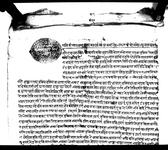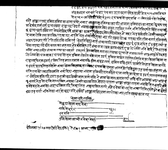A letter from Dhīra Śamśera renewing the annual lokābhāra contract for contractors from Sāmā Gāũ (VS 1924)
ID: L_1200_0029
Edited and
translated by Rajendra Shakya
in collaboration with
Pabitra Bajracharya and Nadine Plachta
Created: 2018-08-16;
Last modified: 2023-01-24
For the metadata of the document, click here
The accompanying edition, translation/synopsis and/or commentary are available under the terms of the Creative Commons Attribution-ShareAlike 4.0 International License
Abstract
This letter from Dhīra Śamśera formalizes the annual lokābhāra contract in the name of Nimā Taṃbe Ghyāpo from the Sāmā Gāũ sector of Ruībhoṭ and strictly orders that local products like wax and musk not be sold elsewhere, but deposited into his treasury as part of the lokābhāra payment.Diplomatic edition
[1r]
1श्री1श्रीराज2१[Seal of Dhīra Śamśera]1स्वस्तिश्रीमद्राजकुमारकुमारात्मजपुर्वतर्फकाकम्यांडिङ्जनरलश्रीधीरसम्सेरजङ्गराणाकस्यपत्र
2म्¯¯¯ ¯¯¯ ¯¯¯ ¯¯¯ ¯¯¯ ¯¯¯ ¯¯¯ ¯¯¯
3आगेहाम्राजनरलिषान्गीमादरियाकोअठारसयेषोलामध्येसामागाउकामुषियानिमातंवे
4घ्यापोरैतानगैह्रके[...]१को१९२५सालआश्विनसुदि१रोजदेषिसालवसालआफ्
5नाआफ्नागाउगाउमादरियाकोवाजविसेर्मास्याफलसिर्तिदरिचलिआयाकोरकमकल[...]
6डडकुंडमर्योअपुतालिचाकचकुइअमालिलेषान्यारकमकलममारिमेटिशिवाये¯ ¯१¯
7अंककल्ल्यानधनधर्माधिकारपंचषतरहतावहतावाहेक वाज्वीमोरु१८१अस्मानिथप
8मोरु १६५||ज्मावेमौजरैमोहोर्रु३४६||रदापचाकोनुन्पाथि|८|स्मेत्वर्ष१कोतिर्नुति[...]
9हरुलेआफ्ना गाउघरमामुषियामुषियाकाझगडापर्योभन्यारअरुठुलाज्यूजमिनकाकुरापरिआयामामुषियाहरुका नाउमाफिर्यादपर्या
10माहेर्चाह गर्नालाईद्वार्यावक्स्याहाम्रापट्टावेदर्ताभयाकारकमकलमस्मेतअसुल्तहसिल्गर्नन्भनितिमिहरुलेविंतिगर्यामा[...]
11कद्वार्यापठाई वक्सौलासो वमोजिम्परिआयाकाकाम[...]तिमिहरुस्मेत्सवैसामेल्भैमद्दतदिनुफर्मायेसिजिन्सीमालहरु[...]
[1r-part2]
12हियामालेषिगयामुताविक्गाउकादरभाउलेदिनुभंन्यागरिलोकाभारगरिवक्स्याकोछगाउघरवसिरस्तिचलाईवस्तिवसाई
13अवाद गुल्जारगरिरैतिराजिराषिजाञिगर्नुविजाञिविदुतनगर्नुअंन्यायगरिरकमकलमवढाईदुखनदिनुडंडकुंडगर्दामु
14षियागाउघरसवैवसिषतमाषतअनुसारअैनवमोजिम्गर्नुअंन्यायमारकम्कलमवढाइदुषदिलियोभनीकोहिरैति कराउना
15आयोभन्याजस्लेअंन्यायगर्याकाठहर्ला उस्लाईअैनवमोजिम्यतावाटगयाकाद्वार्यालेसजायगर्लाआफुआफुलेठेक्कवु
16लिलियाकोदामकामरदापचाकोनुन्मुषियारयेतलेषसोषास्उठाईमुषियामार्फततपसिल्वमोजिम्काकिस्ताकिस्तामा
17हाम्रातहविल्मावुझाईरसिदलिनुसालतमामभयापछिरसिदकव़जल्याईवासिलवाकिवुझाईफार्षतिलिजानुकिस्तामारुपै[...]
18नवुझाईफारक्लिनुसकेनौभन्याकिस्ताषिलााफ्सुतस्मेतरदापचाकोनुन्काअसन्कोविक्रिवुझाउनुपर्लाषतअनुसारआ[...]
19दानिगर्याकोज्माराषिज्मालेभर्नादिदानपुगन्याभयामामुषियारैतानसवैलेदामासाहिकाहिसापउठाईसालवसालकवु
20लवमोजिम्चुक्तिगरीवुझाउनुहामिवाटजिन्सीमाल्फर्मायसिभैआयाकोमाल्चलानगर्दाअघिचलिआयाकाअडाअडावा
21टचलाईदिनुसोहामिसंगदाषिल्भयाकाजिन्सीमालकामोल्मोजरापाउलाआफ्नाआफ्नागाउमाभयाकोमैनकस्तुरिअने
22त्रनवेचनुजोभयाकोञाहादाषिलगरीमिन्हालिनुञाहादाषिल्नगरिअनेत्रवेच्याकोठहर्योभन्यातिमिहरुलेअैनवमोजि[...]
23वुझाउनुपर्लाभनीलोकाभारकोपट्टागरीवक्स्यौंआफ्नाषातिरजमासंगलोकाभारजानिवस्न्याकामगर¯¯¯ ¯¯¯ ¯¯¯ ¯¯¯ ¯¯¯ ¯¯¯ ¯¯¯ ¯¯¯
24किस्तावंदितपसिल्
[table]
| मोहुडाकिस्तामाघमैन्हा | ¯¯¯ ¯¯¯ ¯¯¯ ¯¯¯ ¯¯¯ ¯¯¯ ¯¯¯ ¯¯¯ | |
| नगदिमोहर्रुरु¯¯¯ ¯¯¯ ¯¯¯ ¯¯¯ ¯¯¯ ¯¯¯ ¯¯¯ ¯¯¯ | १३७|| | |
| नुन्पानि¯¯¯ ¯¯¯ ¯¯¯ ¯¯¯ ¯¯¯ ¯¯¯ ¯¯¯ ¯¯¯ | |८| | |
| चुक्तीकिस्ताआश्वीनमैन्हामामोहर्रु¯¯¯ ¯¯¯ ¯¯¯ ¯¯¯ ¯¯¯ ¯¯¯ ¯¯¯ ¯¯¯ | २०९ |
29ईतिसम्वत्१९२४साल्मितिचैत्रसुदि३रोज१शुभ्म्¯¯¯ ¯¯¯ ¯¯¯ ¯¯¯ ¯¯¯ ¯¯¯ ¯¯¯ ¯¯¯[Unknown Seal][Unknown Seal]
Translation
[1r]
Śrī Rāja- 1
[Seal of Dhīra Śamśera]
Hail! A letter from Commanding General of the Eastern Front Dhīra Śamśera Jaṅga Rāṇā, a prince born of a prince
Āge: To Nimā Taṃbe Ghyāpo, the mukhiyā, and all of the ryots (raitāna) and so forth of the Sāmā Gāũ sector within the Aṭhāra Saya Kholā region, which has been registered as [my] khānagī of [my] generalship
We have formalized a lokābhāra [lease contract] under the following terms:
"Except for Śrī rāja-aṅka1 , kalyānadhana, dharmādhikārapañcakhata and arrearages (rahatā bahatā)2 , [all other liabilities] – the scheduled sermā, syāphala and sirto [revenue], [and also] registered customary taxes and levies, and daṇḍakuṇḍa, maryo aputālī, cākacakui, along with rakamakalama enjoyed by the amāli, [all of which] have been imposed on each individual locality of the aforementioned Sāmā Gāũ on a yearly basis, shall [now] receive a complete exemption from the first of the bright fortnight of Āśvina in the [Vikrama] era year 1925 (1868 CE) [onwards]. You shall [therefore] submit a total of 346 mohararupaiyā̃s and 2 sukās, which includes the scheduled [tax] of 181 mohararupaiyā̃s and an additional asmānī levy of 165 mohararupaiyā̃s and 2 sukās, along with 8 pāthīs of salt from Dāpcā for [a period of] one year.
"We shall send a dvāre in accordance with your request since you made a supplication to us with the following details:
'If you send a dvāre to look into and adjudicate (lit. take care of) disputes among mukhiyās that arise in our villages and households, and [also] cases concerning other serious issues regarding life and land along with cases involving lawsuits against mukhiyās, then he can also collect due amounts that were not included (lit. registered) in our paṭṭā.'
"Accordingly, all of you shall participate in and assist any work that needs to be carried out. When [there are orders] in writing for certain items, make the purchase at the current rate in the village and dispatch (lit. give) them.
“Inhabit the [surrounding] countryside and keep the ryots well disposed by overseeing affairs, founding settlements and making crops flourish (ābāda guljāra garī). Do not cause injury and oppression. Do not cause suffering by imposing excess levies. Sit together, [you] the mukhiyā and all [the people] from the individual localities, and rule on fines and penalties in accordance with the Ain, depending upon the crimes committed. If any ryot comes to complain that [they] have suffered due to imposition of excess levies, then the dvāre, who has gone [to your village] from here (i.e. the capital) shall punish, in accordance with the Ain, anyone who is proven to have caused injustice.
“The mukhiyās and ryots shall scrupulously collect [revenue] that each of you has promised to submit in accordance with the lease contract, [including] salt from Dāpcā; as mentioned in the details [below], each village's instalment is to be submitted by the mukhiyās to our treasury, and a receipt [for it] obtained. Once the [fiscal] year ends, bring [all] the receipts and kabacas, submit the ledger (vāsila bā̃kī) and leave only after obtaining a phārakhatī. If [any of you] is unable to obtain a phārakhatī due to the non-submission of an instalment, you will have to pay interest on the instalment as well, and the market rate of Asana 3 for the salt from Dāpcā.
“If, when [the contractual amount] is submitted, the combined revenue from fines imposed [on offenders] according to the faults [they] have committed represents a shortfall [in the total amount agreed to be paid in the contract], then everyone, the mukhiyā [and] ryots, must contribute proportionally [to make up for the shortfall] and pay [the amount due] according to the annual contract.
“When dispatching items required by us, do so from the government office (aḍḍā) that was previously used. The price of the items deposited into our [treasury] shall be deducted [from the contractual amount due]. Do not sell elsewhere the wax and musk available in your village. Deposit all available [wax and musk] here [into our treasury] and get the reduction. If they are proven to have been sold elsewhere instead of being delivered to our treasury, then you [all] shall have to pay in accordance with the Ain."
[Tend the land] with content, considering [it] as a lokābhāra [lease contract].
Tapasila of the instalments:
[table]
| Muhuḍā4 instalment [for] the month of Māgha | - - - | |
| Mohararupaiyā̃s in cash | 137 mohararupaiyā̃s 2 sukās | |
| Salt in pāthī | 8 pāthīs | |
| Instalment to be cleared in the month of Āśvina | 209 mohararupaiyā̃s |
Sunday, the 3rd of the bright fortnight of Caitra in the [Vikrama] era year 1924 (1868 CE). Auspiciousness.
[Two unknown seals]
Commentary
This is one in a series of documents that formalize the renewal of the annual lokābhāra contract. Another document (L_0923_0004), issued on the same day as this one, formalizes a similar annual lokābhāra contract for Chāvā Gāũ of Ruibhoṭa within the Aṭhāra Saya Kholā region. Both mention certain exemptions to come into effect six months after they were issued.
The ranks, functions and jurisdiction of many posts set up in the Rāṇā administration are not always very clear. The posts of mukhiyā, dvāre and amālī, for all their difference, share a function: the collection of revenue. The mukhiyā mentioned in the document was presumably appointed at the local level. There were mukhiyās in the district and central administration as well. Among the three named posts, it is clear from the present document that dvāres ranked above mukhiyās within the local administration, as it states in two instances that (a) the dvāres sent from the centre would address issues arising from any petition is filed against the latter when there are arguments among them or other important work is left unattended; and (b) dvāres would punish any mukhiyā learnt to have acted unjustly to the ryots by imposing excess levies.


